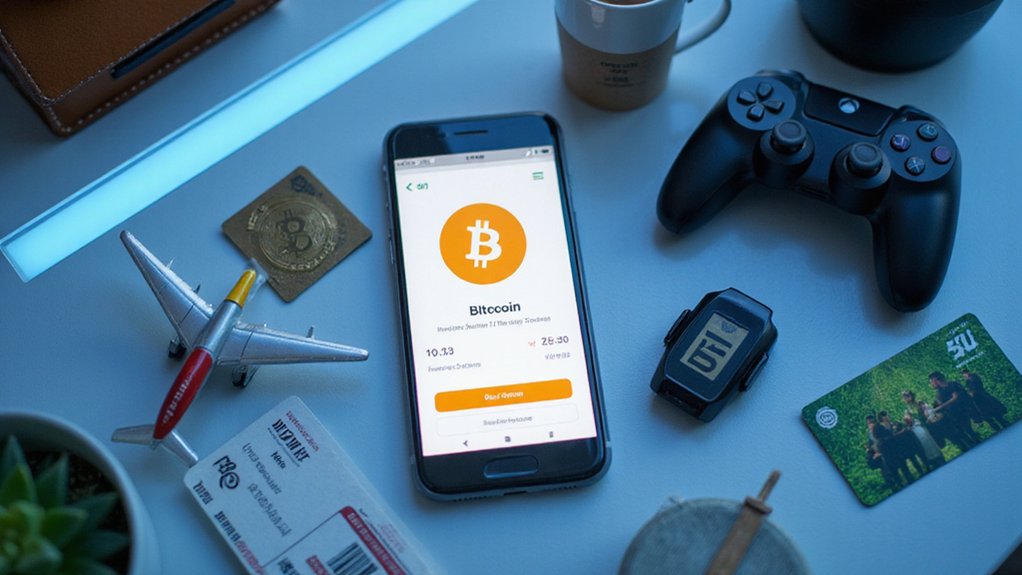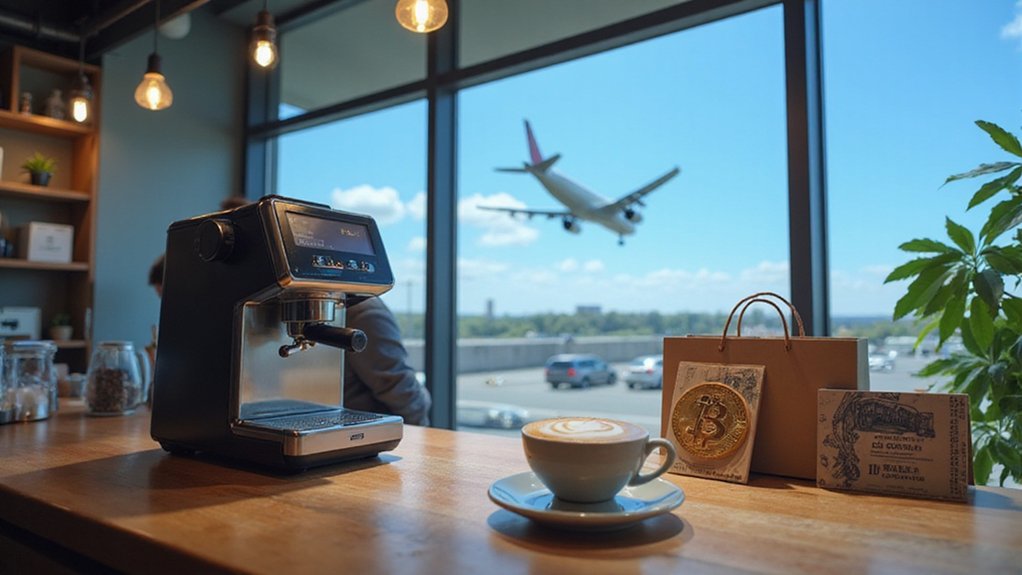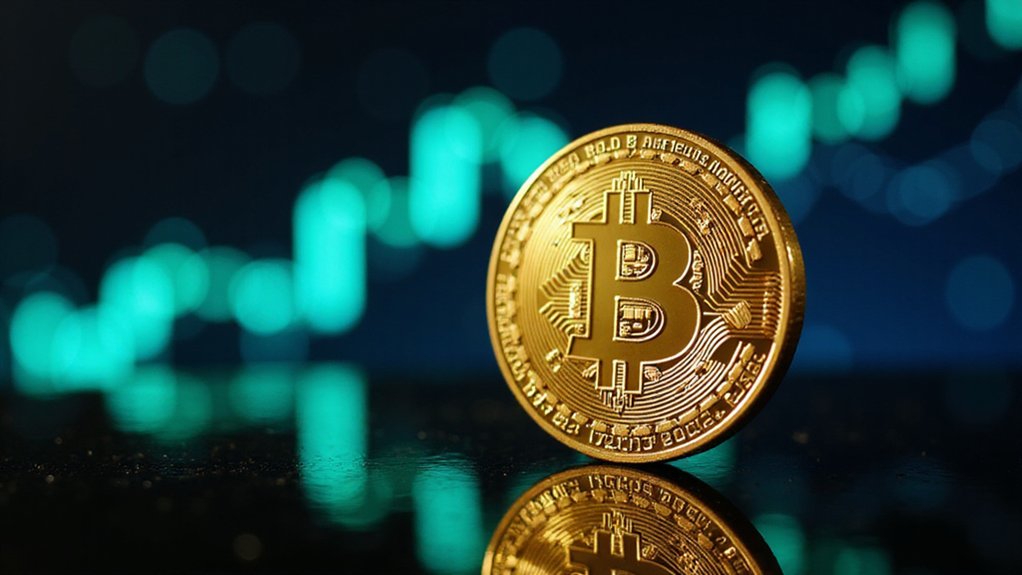Bitcoin’s purchasing power extends far beyond its dubious early reputation, now encompassing legitimate everyday transactions. Travelers can book flights and accommodations through Travala or CheapAir, while entertainment seekers enjoy AMC movies or gaming subscriptions. Retail options range from high-end fashion to technology via payment processors like BitPay, which shields merchants from crypto’s notorious volatility. Even food and beverages—from independent restaurants to Starbucks—have embraced the digital currency. The evolution from dark web curiosity to vending machine currency represents quite the financial transformation.

Where once Bitcoin existed solely as a speculative digital asset—bouncing wildly between valuations that made overnight millionaires or devastated portfolios—it has steadily evolved into a legitimate payment method across surprisingly diverse sectors of the global economy.
The cryptocurrency’s integration into mainstream commerce now extends well beyond the dark web marketplaces that initially cemented its utility.
Today’s Bitcoin holders can leverage their digital wealth across an impressive spectrum of goods and services, transforming once-theoretical value into tangible experiences.
Bitcoin has transcended its digital origins, becoming a practical key to unlock real-world experiences across global marketplaces.
Travel enthusiasts particularly benefit from Bitcoin’s expanding acceptance.
Companies like Travala, CheapAir, and even Expedia have embraced cryptocurrency payments for flights and accommodations, while certain travel sites extend this functionality to car rentals. CheapAir, an American online travel agency, has been accepting crypto payments for flight tickets and hotel reservations since 2013, positioning itself as an early adopter in the travel industry.
For those with truly astronomical aspirations (and correspondingly robust crypto wallets), Virgin Galactic accepts Bitcoin for suborbital space tourism—perhaps the ultimate manifestation of digital currency’s stratospheric potential.
Meanwhile, airBaltic stands among the pioneering airlines directly accepting crypto payments.
Entertainment options for Bitcoin spenders continue multiplying.
AMC Theatres now welcomes cryptocurrency for cinematic experiences, while numerous gaming platforms facilitate Bitcoin transactions for in-game purchases and subscriptions.
Virtual events, digital content marketplaces, and select streaming services (typically via third-party processors) further expand leisure possibilities for the crypto-affluent.
Retail therapy via Bitcoin has similarly evolved.
Services like CoinCards and Bitrefill convert cryptocurrency into gift cards redeemable at over 140 merchants.
Digital goods—software, games, subscriptions—represent particularly frictionless Bitcoin transactions.
High-end fashion brands, home goods retailers, and technology stores increasingly accommodate cryptocurrency payments, catering to Bitcoin’s aspirational demographic.
Many businesses now implement BitPay as their payment gateway to accept Bitcoin and over 100 other cryptocurrencies while protecting themselves from price volatility.
Even daily sustenance falls within Bitcoin’s purview.
Independent restaurants, coffee shops, specialty food purveyors, and select delivery services now accept cryptocurrency payments. Starbucks, the global coffee giant, has joined this trend by allowing customers to pay for their favorite beverages using Bitcoin and cryptocurrencies through their digital loyalty program.
Perhaps most emblematic of Bitcoin’s journey from obscurity to ubiquity: vending machines that dispense snacks for satoshis—a transaction simultaneously mundane and revolutionary, emblematic of cryptocurrency’s paradoxical nature as both futuristic experiment and increasingly ordinary payment method.
Frequently Asked Questions
How Do I Safely Store My Bitcoins?
Storing Bitcoin safely requires layered security approaches.
Hardware wallets (Ledger, Trezor) provide best protection by keeping private keys offline—away from potential digital marauders.
For the security-conscious investor, implementing dual-factor authentication, regular firmware updates, and securely stored recovery phrases (not digitally, heaven forbid) creates a formidable defense.
Cold storage solutions offer peace of mind that hot wallets simply cannot match.
And remember, one’s private keys should remain precisely that—private.
What Taxes Apply When Purchasing Goods With Bitcoin?
When purchasing goods with Bitcoin, the transaction triggers capital gains tax obligations—essentially, the IRS views this as disposing of property.
The difference between the Bitcoin’s acquisition cost and its value when spent constitutes the taxable gain or loss.
Long-term holdings (over one year) enjoy preferential tax rates (0-20%), while short-term gains face ordinary income rates (10-37%).
Merchants, meanwhile, must report Bitcoin payments as business income and navigate their own set of compliance requirements.
Tax implications vary substantially across international jurisdictions.
Can Bitcoin Purchases Be Traced Back to Me?
Bitcoin purchases can indeed be traced back to individuals—a fact that might surprise those who’ve embraced cryptocurrency’s supposed anonymity.
The blockchain’s public ledger guarantees transactions remain visible, while sophisticated analytical tools from firms like Chainalysis and Elliptic can connect addresses to real-world identities with remarkable precision.
Though users maintain pseudonymity initially, behavior patterns, cluster analysis, and machine learning algorithms make approximately 60% of transactions identifiable—rendering Bitcoin considerably less private than its reputation might suggest.
How Long Do Bitcoin Transactions Typically Take to Process?
Bitcoin transactions operate on a sliding scale of patience-testing durations.
Typically, they process in 10 minutes to over an hour, with six confirmations (the gold standard for security) taking approximately 60 minutes under ideal conditions.
Network congestion—that perennial thorn in crypto’s side—can extend this timeframe considerably, while transaction fees function as the not-so-subtle bribe that might expedite one’s financial endeavors.
Off-peak hours present the savvy user with marginally improved processing times.
Are Bitcoin Payments Reversible if I’m Scammed?
Bitcoin transactions are definitively irreversible—a feature that’s simultaneously their strength and Achilles’ heel.
Once confirmed on the blockchain, these transfers exist in digital perpetuity, impervious to chargebacks or third-party interventions.
Victims of scams face a sobering reality: recovery options are virtually nonexistent, with law enforcement perpetually playing catch-up to sophisticated cross-border fraud.
The blockchain’s immutability—celebrated by libertarian enthusiasts—reveals its darker implications when one finds themselves on the wrong side of a confidence scheme.









